Jesuit State in South America
The Jesuit order that still exists today (15 members in 842 countries in 112, 2018 of them were priest) has a terrible reputation. The expression "Jesuit methods" has long become synonymous with unscrupulous actions. The words of Iñigo (Ignatius) Loyola are often quoted:
The founder of the order is also credited with the authorship of the famous phrase "the end justifies the means." Meanwhile, as early as 1532, Niccolo Machiavelli used a similar expression in the book "The Emperor".
Another version of the phrase belongs to the English philosopher Thomas Hobbes. But Blaise Pascal in his work "Letters to the Provincial" put the words in the mouth of a Jesuit:
Finally, this phrase appeared in the "Book of Moral Theology" by the Jesuit writer Antonio Antonio Escobar y Mendoza. In fact, the motto of the Jesuit Order is "To the greater glory of God."

Jesuit coat of arms
The general attitude towards the Jesuits is expressed in a quotation from the parody "General storiesprocessed by Satyricon ":
(Apparently, it is assumed that its members should be "hung by the neck").
Even the educational activities of the Jesuits (the successes in which were undeniable and very great) are reproached with the order: they say, they take innocent children and turn them into fanatical, but hypocritical monsters.
Black legend
Meanwhile, one can hear the opinion that the Jesuits were slandered by members of other religious orders. And they could do this out of a sense of elementary envy. There are also many black and bloody spots on their reputation. The Dominican Order, for example, traditionally supplied judges to inquisitorial tribunals, and the hands of its founder were covered in blood not even up to the elbows, but up to the very shoulders. But the Jesuits, like a lightning rod, distracted and divert all attention to themselves.
As early as 1551, the Augustinian monk George Brown compared the Jesuits to the Pharisees and accused them of seeking to "destroy the truth." Then the Dominican Melchor Kano spoke out against the Jesuits. Later, some false documents were written, in which the Jesuits were ascribed a desire for all-encompassing power, which should be achieved at any cost, without disdaining the most dirty methods. Some authors called the Jesuits the heirs of the Templars and claimed that they were the first Illuminati.
There were grounds for envy. The Jesuits' rivals were less fanatical and less effective. There is a legend about the theological dispute between the Jesuits and the Augustinians. When the theoretical theses did not reveal the advantages of either side, it was decided to move on to practice. By order of the head of the Jesuit delegation, one of the monks accompanying him took the burning coals from the hearth in his palm and walked with them along those present. The Augustines were not ready for such a competition and admitted defeat.
Even the Vatican had a very controversial view of the Society of Jesus. On the one hand, 41 Jesuits are canonized (including Loyola himself), and 285 are blessed.
And on this icon we see Francis Xavier, one of the first 6 students and associates of Loyola.

Saint François Xavie, patron saint of Australia, New Zealand, China, India, Japan and Borneo, patron of all foreign missions, since 1952 - patron saint of tourists
On the other hand, the Jesuit order was officially banned by the Vatican from 1773 to 1814, but managed to survive (including with the help of Catherine II, who opened the door to Russia for it).
The truth, as always, is in the middle. So, John Ballard was executed for complicity in a conspiracy to assassinate Elizabeth of England, Henry Garnet - for participating in the Gunpowder Plot. And Pedro Arrupe led the first rescue team in the atomic bombed Hiroshima. Astronomer Christopher Clavius created the final version of the Gregorian calendar, Honore Fabri explained the blue color of the sky. The camellia flower got its name in honor of the Czech Jesuit botanist Georg Josef Kamel. Francisco Suarez was the first to talk about international law, the criteria for a just and moderate war, and even the right to overthrow monarchs.
Along with the truly dark and unsightly pages of the history of this order (which no one is going to deny), the Jesuits have sometimes demonstrated amazing success in the most unexpected areas. One of the most amazing episodes in world history is their creation in South America of a successful and stable (existed for more than 150 years!) State, the citizens of which were the local Guaraní Indians.
Guarani of South America
It is curious that the Guarani Indians were cannibals and began their acquaintance with the Europeans by eating the commander of one of the Conquistadorian troops, don Juan de Solis. However, this cannibalism was of a ritual nature: usually the most valiant and powerful enemies were eaten, among which, apparently, de Solis was credited. And in 1541, one of the Guaraní tribes burned down Buenos Aires.

Guarani, Paraguay
Translated into Russian, the word guarani means "warrior", however, compared to other tribes, these Indians did not differ in particular militancy and were inclined to a sedentary lifestyle.
The Guarani practiced slash-and-burn agriculture, staying in one place for 5-6 years. When the soil was depleted, the whole tribe moved to another place. They also raised birds and pigs, hunted and fished. The Franciscans were the first to preach Christianity among the Guaraní. Of particular note is Luis de Bolaños, who was the first to learn the Guarani language and even translated some of the religious texts into it. But it was the Jesuits who then worked so successfully with these Indians that Montesquieu wrote:
And Voltaire even called the experiment of the Paraguayan Jesuits "in some respects a triumph of mankind."
What is Paraguay
Let's say right away that the territories of modern Paraguay and the Paraguayan state of the Jesuits do not coincide. The Spanish colonial authorities considered Paraguay a territory that also includes part of the lands of modern Bolivia, Argentina and Uruguay. This Paraguay was part of the Viceroyalty of Peru and was subordinate to the Governor of Asuncion. And the Jesuit province of Paraguay did include all of Argentina, all of Uruguay and the modern Brazilian province of Rio Grande do Sul.
Jesuits in South America
How did it all begin and why did the order, in general, take this tribe under its tutelage?
The Jesuits took an active part in missionary work in the newly discovered lands of Africa, Asia and America. The first Jesuits arrived on the coast of South America (the territory of modern Brazil) in 1549. And already in 1585 they appeared on the lands of modern Paraguay.
In 1608, King Philip III of Spain asked the Jesuits to send their missionaries to the Guaraní. The Jesuits took this assignment very seriously. The first settlement of the Indians baptized by them ("reduction" - reducir, from the Spanish "convert, convert, lead to faith") was founded in March 1610. It was named Nuestra Senora de Loreto.
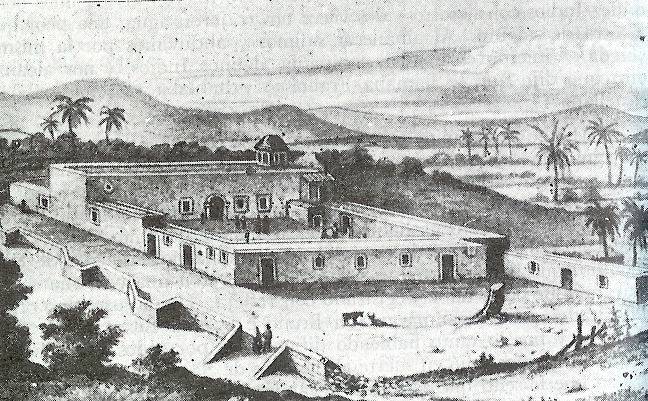
Reduction of Nuestra Senora de Loreto on an XNUMXth century engraving
Among the Indians, there were so many who wanted to settle in it that already in 1611, a new reduction was founded - San Ignacio Guazu.
In the same year 1611, the Jesuits achieved the exemption of their wards from paying taxes for a period of 10 years. In 1620, the number of reductions increased to 13, and their population was about 100 thousand people. 10 years later, in 1630, there were already 27 reductions. In total, the Jesuits created 31 reductions.
Portuguese Bandeiras against Jesuit reductions
However, the territory occupied by the Guaraní was problematic. It was located at the junction of the possessions of Spain and Portugal. And the Portuguese "Paulist" Bandeiras (squads of slave hunters from São Paulo) regularly raided these lands. For the Portuguese, the Bandeirants were pioneering heroes.
The Spaniards assessed their activities in a completely different way. In the documents of the same Jesuits, it is said that the Bandeirants "look more like wild beasts than rational people." They were also called "people without a soul that kill Indians like animals, regardless of age and gender." At first, the Bandeyrants killed or enslaved the "no-man's Indians". Then it was the turn of the Guaraní, who were listed as subjects of the Spanish crown.
The result of such actions was a sharp decline in the number of the Indians of this tribe. The Jesuits soon became convinced that they could not solve the problem of these raids. The first Paulist attack on the reduction was recorded in 1620: the settlement of Incarnacion was completely destroyed, several hundred Indians were taken into slavery.
In 1628-1629, the Portuguese Bandeira under the leadership of Antonio Raposo Tavares east of the Parana River defeated 11 of the 13 reductions located there.
In 1631, the Paulists destroyed 4 reductions and took about a thousand Indians prisoner. This year the Jesuits were forced to evacuate part of the remaining settlements. Since 1635, Bandeirant raids have become annual.
In 1639 (according to other sources - in 1640), the Jesuits obtained permission from the authorities to arm the Indians. And in 1640 he managed to get a bull from the Pope, prohibiting the enslavement of baptized Indians. For the Bandeirans, the armament of the Indians had the most sad consequences: their expeditions in 1641, 1652 and 1676 completely failed and ended in almost a military disaster.
Indian resettlement
Nevertheless, the Jesuits decided to take their charges away from the Portuguese.
In 1640, they already organized a massive resettlement of Indians to the inland lands of the mainland. Their authority was already so high that the Indians unquestioningly followed them. Ultimately, new reductions were built in the difficult terrain between the Andes and the Parana, La Plata, Uruguay rivers. Currently, these are the border areas of three countries - Argentina, Brazil and Paraguay. It was here that the Jesuits created their Indian state, the memory of which is still alive: in all these countries, the areas previously occupied by them are called Misiones ("Missions") - this is how the Jesuits themselves called their lands.
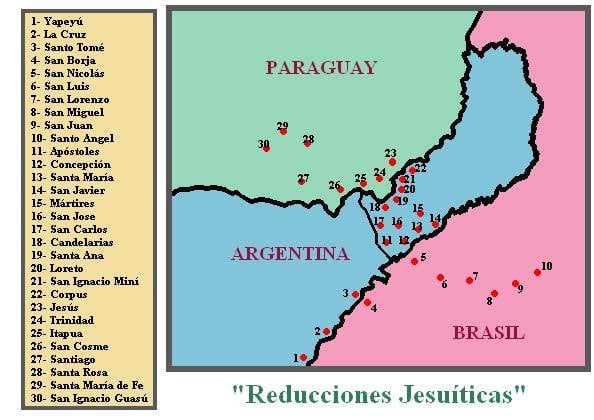
Reductions of the Jesuits. Recall that the territories of the Jesuit province of Paraguay and the modern state of Paraguay do not coincide
The territory now occupied by the Indians led by the Jesuits was remote from trade routes, did not have valuable natural resources and therefore was of little interest to the authorities.
Thus, the Jesuits built their state in spite of the circumstances, and its economic well-being caused considerable surprise to contemporaries.
State of Paraguayan Jesuits
The idea of creating a social Christian state is believed to belong to two Jesuits - Simon Macete and Cataldino. Some researchers believe that they developed this project under the influence of the ideas of Tommaso Campanella, especially his book "City of the Sun", published in 1623. According to their plan, in the reductions it was necessary to organize a correct religious life, which was supposed to protect converts from temptations and contribute to the salvation of their souls. Therefore, in all reductions, they did not spare money for the construction of richly decorated temples, a visit to which was mandatory.
The practical implementation of these ideas fell to the lot of Diego de Torres and Montoja. The first of them, in 1607, became the abbot of the Paraguayan "province". Previously, de Torres conducted missionary work in Peru. He clearly borrowed some ideas of the state structure from the Incas.
In 1645, the Jesuits were able to receive from Philip III the most important privilege: the secular authorities now had no right to interfere in their activities. The hands of the “holy fathers” were finally untied, and they got the opportunity to conduct their grandiose social experiment.
The reductions community has all the signs of statehood: central and local government, its own army, police, courts and prisons, hospitals. The number of reductions soon reached 31, the population of each of them ranged from 500 to 8 thousand. Some researchers argue that the population of the largest reduction, named after Francis Xavier, at some point reached 30 thousand people.
All reductions were built according to a single plan and were fortified settlements. In the center was a square with a church. On one side of the church was adjacent to a cemetery, behind which there was always an orphanage and a house where widows lived. On the other side of the cathedral, the building of the local "administration" was built, behind it - a school (in which girls studied), workshops and public warehouses. On the same side there was a priests' house surrounded by a garden. On the outskirts, identical square Indian houses were built.
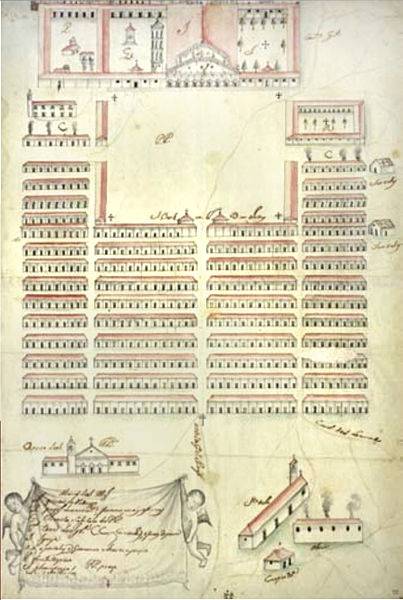
Plano da Redução de São Miguel Arcanjo
Each of the reductions was headed by two Jesuits. The older one (in age) usually focused on "ideological work", the younger one took on administrative duties. In their work they relied on the corregidor, the mayors, and other officials, who were elected once a year by the population of the reductions. Since 1639, each reduction had well-armed detachments. During the period of the greatest power of the Jesuit state, they could deploy an army of 12 thousand people. One day, the Guarani army forced the British who were besieging this city to withdraw from Buenos Aires.
Thus, we see an example of simply unprecedented management efficiency: only two Jesuits, who stood at the head of the reduction, kept up to several thousand Indians in unconditional submission. At the same time, not a single case of an uprising of the population of reductions or any significant rebellion against the rule of the Jesuits is described. The crime rate was also extremely low, and the punishments were mild. It is argued that these were most often used public censure, fasting and penance. For serious offenses, the perpetrator received no more than 25 blows with a stick. As a last resort, the offender was sentenced to imprisonment, the term of which could not exceed 10 years.
In order to "help" the Indians to avoid temptation, they were forbidden not only to leave the settlements without permission, but also to go outside at night. Residential buildings usually had only one large room. These dwellings did not have entrance doors and windows.
Before meeting the Europeans, the Guaraní did not know private property. The Jesuits acted in the spirit of these traditions: the work was of a public nature, the products produced went to common warehouses, consumption was of an equalizing nature. Only after the wedding, a small plot of land was allocated to the new family, however, according to the testimony of contemporaries, the Indians were reluctant to work on it, and often it remained uncultivated.
In addition to traditional agricultural work, the Jesuits began to attract their wards to various crafts. Jesuit Antonio Sepp reports that in the large reduction of Yapeia, not only wooden buildings, but also large stone buildings, lime kilns, brick factories, a spinning workshop, dye-houses, and mills were built. In some places there was a foundry (the Indians learned how to cast bells).
In other reductions, shipyards were established (they built ships on which goods for sale were transported to the Atlantic coast along the Parana River), pottery workshops and workshops for wood and stone carving. There were even their own jewelers, gunsmiths and craftsmen who produced musical instruments. And in the reduction of Cordoba, a printing house was set up that printed spiritual literature in a language specially created by the Jesuits for the Guaraní. Trade in reductions was prohibited, but "external" flourished - with the settlements of the coast. The trade expeditions were led by one of the Jesuit leaders in charge of the reduction.
Marriages in this state were committed not out of love, but by the will of the heads of families. Girls were married at the age of 14, their grooms were 16.
Thus, we see some kind of "police state": life is strictly regulated, "leveling" flourishes. Denis Diderot did not like this, and he called the state system of the Jesuits "erroneous and demoralizing." However, as W. Churchill once said,
The Guarani seemed to suit the Jesuit order. And then they stubbornly defended their reductions with weapons in hand.
The collapse of the Jesuit state
In 1750, another treaty on the division of lands and spheres of influence in the New World was signed between Spain and Portugal. As a result, some of the reductions ended up in Portuguese territory. Their residents were ordered to leave their homes and move to Spanish lands. Meanwhile, the population in these reductions reached 30 thousand people, and the livestock population totaled up to a million heads.
As a result, the Indians of 7 reductions ignored this order, being left alone with Portugal and its army. The first major clashes took place in 1753, when four reductions repulsed the offensive of the Portuguese, and then the Spanish army. In 1756, the Spanish and Portuguese joined forces to defeat the rebels.
In 1761, this treaty between Spain and Portugal was canceled, but the order no longer had time to restore the destroyed reductions. The clouds were gathering over the order. In both Paraguay and Spain, rumors spread about the unheard-of wealth of the Jesuits and their "state" in Paraguay. The temptation to "rob" them was very great - just as the French king Philip IV had robbed the Templars in his time.
In 1767, a royal decree was issued, according to which the activities of the Jesuits were prohibited both in Spain and in its colonies. A mutiny broke out, to suppress which 5 thousand soldiers were thrown. As a result, 85 people were hanged in South America and 664 were sentenced to hard labor. In addition, 2260 Jesuits and their sympathizers were expelled. Then 437 people were expelled from Paraguay. The figure does not seem large, but these were the people who controlled about 113 thousand Indians.
Some reductions resisted, protecting their leaders, but the forces were not equal. As a result, it turned out that the Jesuit fathers (to the great chagrin of the royal officials) were honest people and the money they earned was not hidden under pillows, but spent on the needs of reductions. Deprived of adequate and authoritative leadership, these Indian settlements very quickly ceased to be profitable and became empty. Back in 1801, about 40 thousand Indians lived on the lands of the former "state" of the Jesuits (almost three times less than in 1767), and in 1835 only about 5 thousand Guarani were counted.
And the ruins of their missions - reductions, some of which have become tourist attractions of modern Paraguay, remind of the grandiose social experiment of the Jesuits.
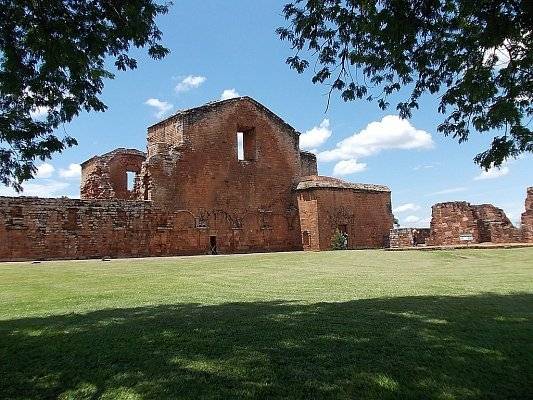
Reduction of La Santisima Tinidad de Parana

Modern Guarani in Brazil
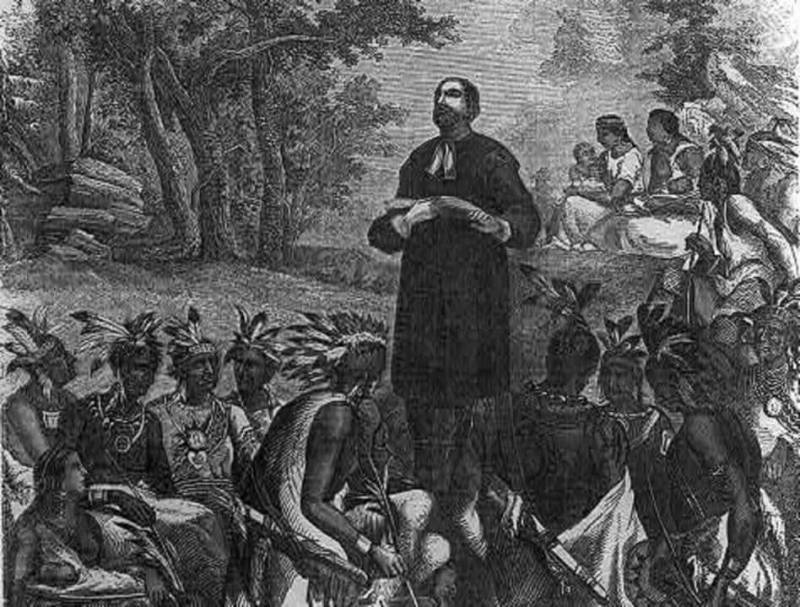
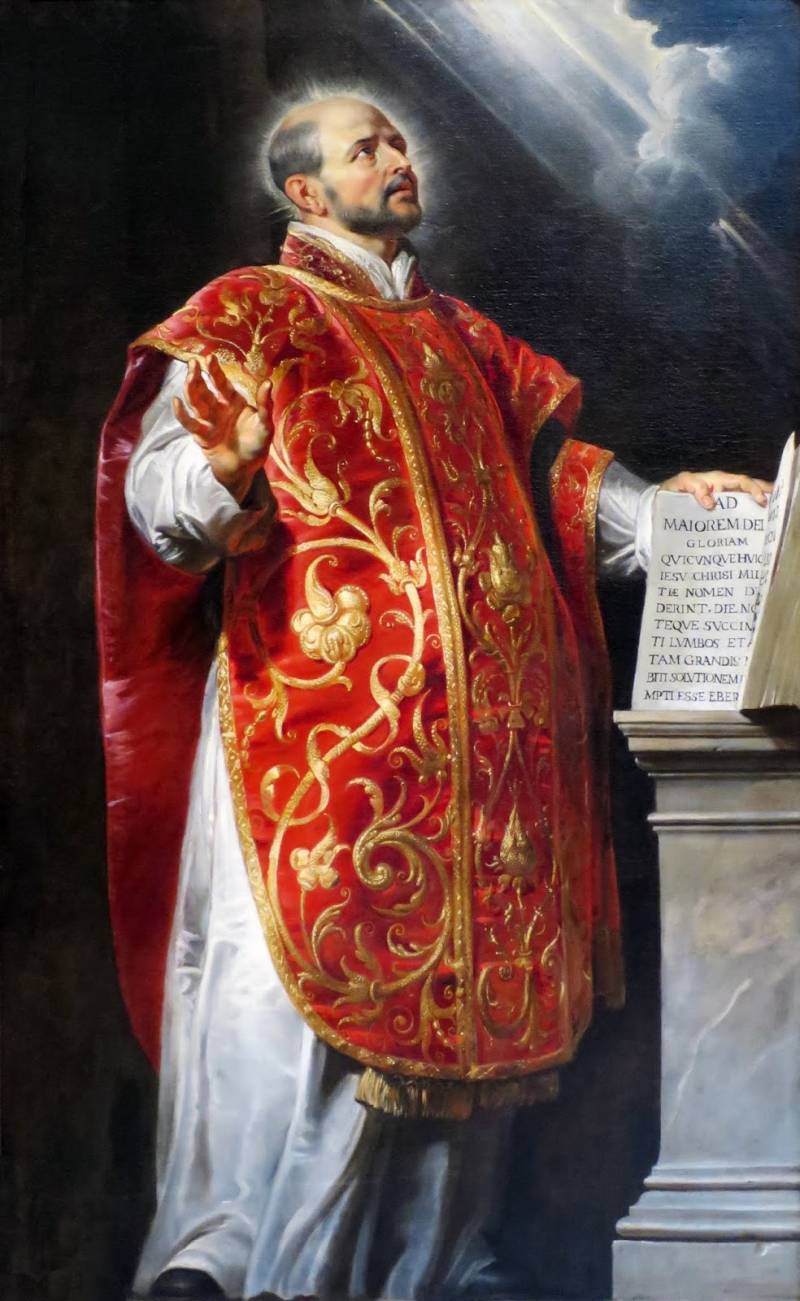
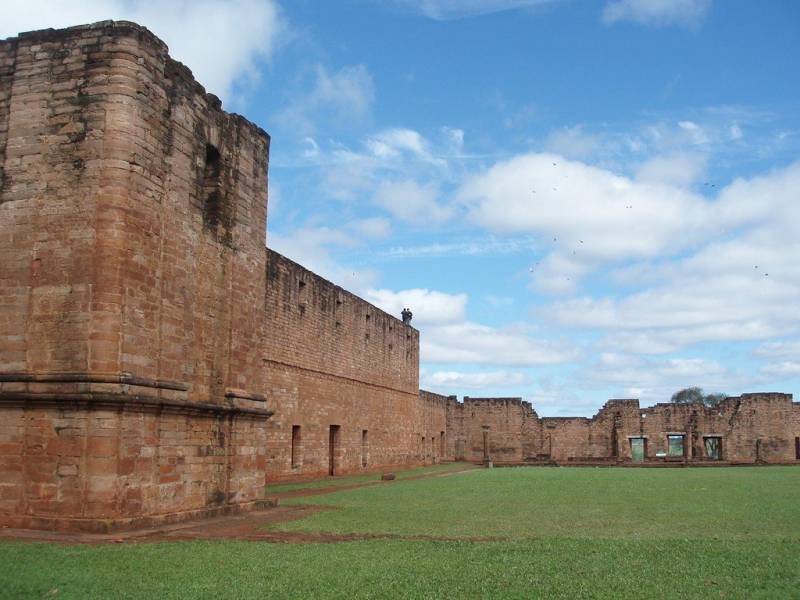
Information